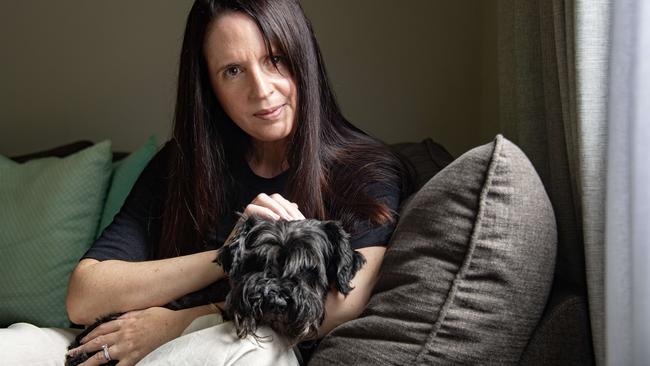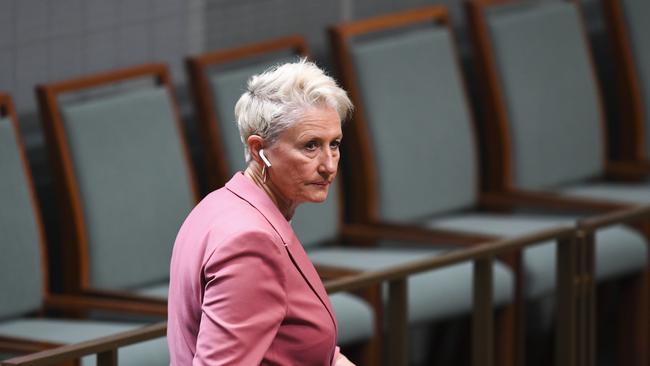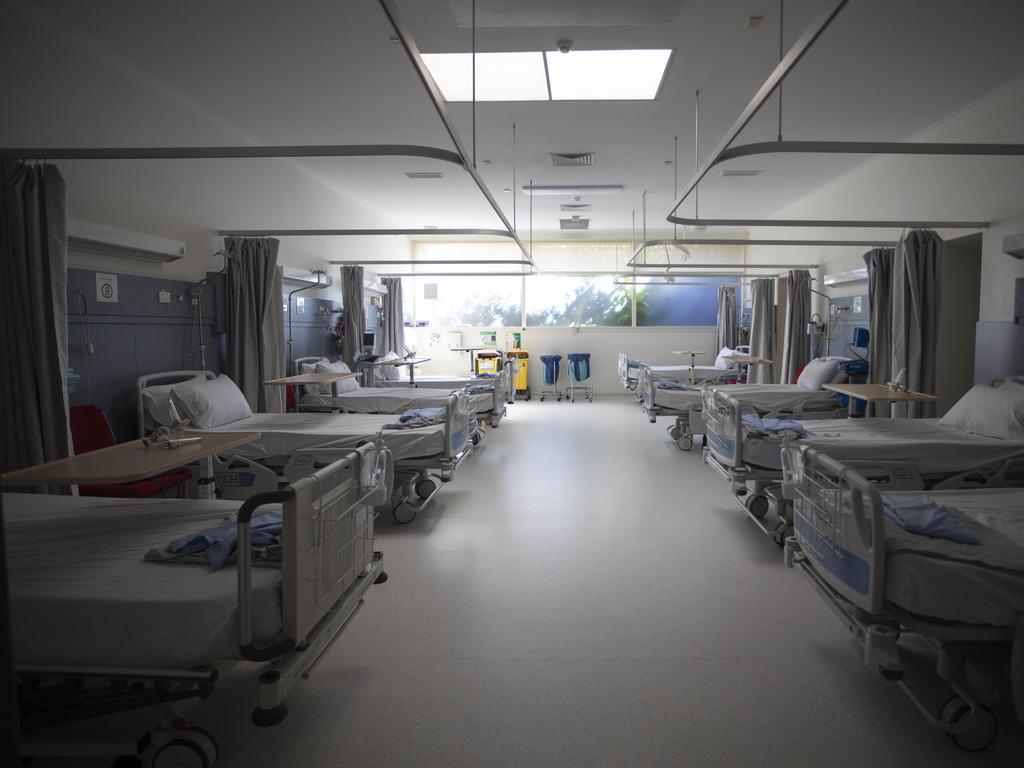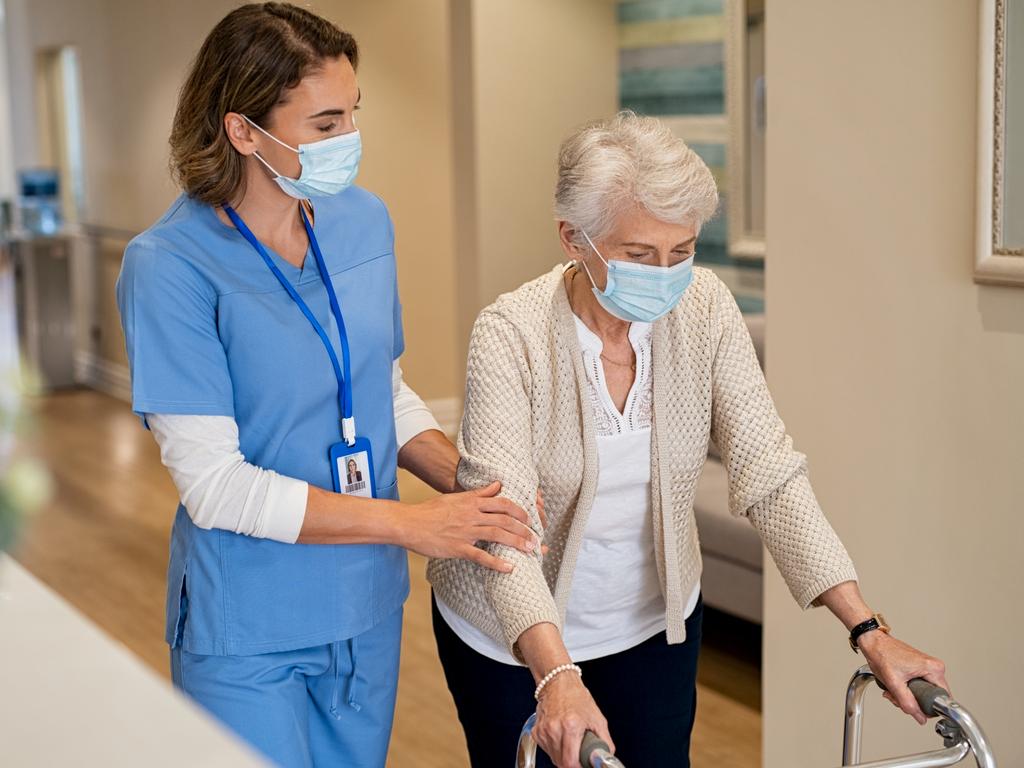‘No one wants to know that we exist’, say sufferers of after effects of Covid vaccines
Now that the emergency phase of the pandemic has been declared over, Australians are speaking out about health problems they suffered soon after receiving a Covid-19 vaccine.

Naomi Smith had to think long and hard before she opened her Facebook page and tapped out a message to her circle of friends and contacts.
“As a person who generally is open about life’s ups and downs I’m not sure why I was keeping this quiet,’’ she began.
Thinking back to that post now, she understands why she’d been silent about what happened to her. “I didn’t want to be the reason why someone didn’t get vaccinated,’’ she says from her Cairns home.
There was another reason she was cautious about telling her story: “I didn’t want it to be used by the anti-vax movement.”
In that initial post in December 2021, Smith, then 43, revealed that she’d started experiencing chest pains days after her second Pfizer Covid-19 vaccination in October. An avid hiker and gym goer with no history of poor health, she thought she’d pulled a muscle. “But this felt different. It progressively got worse … I had severe chest pain and I couldn’t breathe properly.”
Taken to hospital by ambulance, Smith was diagnosed with acute pericarditis, inflammation of the thin sac that surrounds the heart. This was a known rare side effect of the mRNA Covid vaccines (Pfizer and Moderna) more commonly associated with young men and teenage boys after the second dose. It is also a symptom of a Covid infection but Smith says she hadn’t had the virus.
She was told to go home, rest and take painkillers and because most cases were mild she was reassured it should resolve in two to three weeks.
Fifteen months on, there’s still a note of disbelief in her voice as she describes what happened.
The once busy technology consultant who worked with big companies to build their HR platforms, who travelled regularly for work and spent her holidays hiking mountains from Peru to Mt Kilimanjaro in Tanzania, can no longer work full-time. At most she can walk a kilometre.
She’s had ongoing chest pain, numbness down one side of her body, extreme fatigue, cognitive decline and short-term memory loss and tinnitus (ringing in her ears). She’s been back and forth to hospital and to specialists for tests but still has no answers on what is happening to her and why.
Now that the emergency phase of the pandemic has been declared over by chief health officer Paul Kelly, other Australians have joined Smith in speaking out about health problems they suffered soon after receiving a Covid-19 vaccine.
Along with some doctors, they’re calling for a review to examine the vaccine program and response, not to undermine it or to play into the hands of conspiracy theorists, but to assess the reporting systems for adverse reactions and identify who might be at increased risk and why.
Their efforts for recognition have been buoyed by comments from former AMA president Kerryn Phelps, who revealed her wife’s ongoing health problems and spoke of her own side effects following a Covid vaccine. “Vaccine injury is a subject that few in the medical profession have wanted to talk about,’’ Phelps, a former federal MP, wrote in a submission to a parliamentary inquiry into long Covid (ongoing symptoms after a Covid infection).
“Without acknowledgment and recognition of post-vaccination syndrome or vaccine injury, there can be no progress in developing protocols for diagnosis and treatment and it is difficult to be included in research projects or treatment programs. It has also meant a long and frustrating search for acknowledgment and an attempt at treatment for many individual patients.”
Lack of interest
Smith says she reported her adverse reaction to the Therapeutic Goods Administration (TGA) and waited, thinking there would be interest in her case. Nine days later she received a message from Queensland Health’s Covid-19 Vaccination AEFI (adverse events following immunisation) unit advising her not to have any further mRNA vaccines, and to follow up with a cardiologist.
“I was so naive, I thought there would be scores of people ready if things went wrong,’’ she says. “I expected people would want to know exactly what had happened, or that the TGA would have some sort of process because you are so sick and no one seems to know what to do with you.”
Frustrated by the lack of interest in her case and seeking answers, she started looking online and found a pericarditis/myocarditis support group. “I thought I must be the only person in the world with this condition because I wasn’t hearing of other cases,” Smith says.
She was surprised to find others, including women around her age, in a similar position. She’s now a director of Coverse, a not-for-profit representing people who have suffered a severe adverse reaction following a Covid vaccine. “We want people to understand that there are people out there who have been unwell and yes we might be a minority but we are suffering in a significant way and we have been absolutely ignored and silenced,’’ she says.
“We did the right thing, for the community good, and now no one wants to help or listen to us.
“I’ve done nothing wrong and I refuse to be embarrassed or ashamed of what happened to me.”
Listen to the science
Almost 65 million Covid-19 vaccines have been administered in Australia in a program heralded for preventing deaths, hospitalisations and severe illness.
Vaccines are clearly lifesaving, says Julie Leask, a social scientist specialising in immunisation at the University of Sydney’s School of Nursing and Midwifery who did her PHD on vaccine scares and the impact on patients.
She listens to the issues raised by people linking their health problems with the vaccine and her message is clear: it’s a fraught topic, please listen to the science.
“You have to remember that bad things happen to people’s health anyway and sometimes people will forensically look back for a cause and think it’s the vaccine,’’ she says.
Leask co-authored an article with other vaccine experts late last year, published on The Conversation website. Not everything that happens after a vaccine is due to the vaccine and the timeframe for a new health condition arising after vaccine is only one factor to consider, the experts said.
Leask talks about causal hunger – patients with fairly nondescript syndromes with uncertain origins who are looking for a reason. “And that causal hunger is sometimes satisfied through the belief that the vaccine caused it because people naturally want to understand and therefore have control over what happened to them,” she says.
“That’s not to say that vaccines are never responsible for problems. They can be. But my experience through decades is that the vast majority of things that people say the vaccine has caused are never found to be caused by vaccines when they do more in-depth studies.’’
Leask says that rare but serious events were detected and communicated to the public during the rollout: the rare clotting disorder associated with the AstraZeneca vaccine (one in 50,000 doses) and myocarditis (inflammation of the heart muscle) after mRNA vaccines, particularly in teenage boys and young men (two to 10 cases per 100,000 second Pfizer doses).
“Other rare conditions related to Covid-19 vaccines include anaphylaxis, Guillain-Barre syndrome and immune thrombocytopenia. However, the risk for these events is lower than the serious risks from Covid-19 itself in the absence of vaccination,” the experts said.
More research needed
Leask says that stringent and ongoing vaccine surveillance by multiple authorities gives her confidence that adverse events are being accurately captured and the TGA says it closely monitors reports of suspected side effects.
The TGA’s latest report says that of the almost 65 million doses so far in Australia, 137,406 adverse events have been reported, mostly for headache, muscle pain, fever and a sore arm. It says there have been 14 deaths linked to the vaccinations. As at November, 13,641 people had died with or from Covid, according to the Australian Bureau of Statistics.
Like long Covid, it’s not clear how many people have ongoing issues from a suspected reaction to the vaccine and Melbourne GP Vicki Kotsirilos says more research is needed.
She says doctors were actively encouraged to report adverse events either to the TGA or through the Safevac website, and from her experience reporting a number of severe reactions it was an important but time-consuming process for a busy GP.
“During the period of active vaccination for Covid-19 I encountered about 20 patients over a one-year period who suffered severe and unusual reactions lasting beyond the usual expected time frame,’’ she says. Most patients partially or fully recovered but one is still severely debilitated.
“As GPs, we know that most people will be fine when vaccinated with Covid vaccines and the majority will get better if they have minor symptoms … but here we are talking about a small group of patients who have suffered severe disabling symptoms that went beyond the expected one to two weeks of recovery.”
Kotsirilos says she had no doubt that their symptoms were caused by the vaccine and this was confirmed by referring specialists.
“Most of the severe reactions I have seen are neurological, cardiovascular and also a couple of patients with auto-immune disease flare ups,’’ she says, adding that she was surprised by the number of patients with unusual symptoms. “Because we were not informed that there could be more severe, unusual or disabling reactions. And nor were we informed at what rate they would occur.
“There definitely needs to be more research, improvements to the vaccine safety data collection system and we need to actively follow up those patients who did suffer reactions, to see how they are and record what time frame they got better and whether their symptoms resolved.
“We could learn from the experience and learn from these patients by following them up.”
OzSage, a network of scientific and medical experts of which Phelps is a member, has released a position statement highlighting the need for further guidelines to manage uncommon adverse events after vaccination, including the need for special clinics to monitor these rare cases. “The OzSage document outlines the scope but not the scale of the problem because we do not know the scale of the problem,’’ Phelps says in her submission to the long Covid inquiry.
The interest group Coverse estimates the number of people with severe ongoing reactions to be in the thousands and notes significant overlap with the symptoms of long Covid.

Sydney cardiologist Ross Walker says that by the middle of last year, he had about 100 patients presenting with symptoms after their mRNA vaccines. “This is an anecdote not a clinical trial … but I was seeing people with chest pains, shortness of breath, dizziness. These reactions tended to last for three or four months and then settle down in most cases. But equally I’ve seen people with a lot worse symptoms after Covid itself. Covid is the problem, not vaccination.”
Organs shutting down
Sydney accountant Habib Khan, 36, is one of the unlucky ones, one of the rare people who had a major reaction days after his Pfizer vaccine. He was vaccinated about five weeks after having a mild Covid infection, and so his case is of great interest to the medical profession.
More than a year on he’s still not sure why he deteriorated so suddenly in the days after his first shot in September 2021.
Fever, fatigue, dizziness and a rash soon escalated to vomiting and chest pain, myocarditis and then heart failure. He lists off his symptoms, his transfer to three hospitals and then to intensive care where he was placed on life support while his family prepared to say goodbye.
“I was briefed by a group of doctors who all told me my heart, lungs, kidneys were all shutting down. My immune system was apparently failing because of an extreme response to the antibodies.
“Basically my entire body was supported by machines. Nothing was working, they were discussing a heart transplant. Then, after a week on a ventilator, I was lucky, my body began to respond.”
After a month in hospital his recovery has been remarkable but has involved months of rehabilitation. Unable to work for much of this time, he sold his house and moved back in with his parents. “Physically, mentally, financially, it’s been hard,” he says.
Khan tries not to dwell on it. He’s back at work three days a week and last August he completed the City 2 Surf fun run. And despite what he’s been through he is fully vaccinated. Under medical guidance, and wanting to be in the hospital for the birth of his first child last year, he went back for his second shot, not an mRNA vaccine this time, but Novavax.
Khan says his injury was recognised under the federal government’s Vaccine Compensation Scheme, set up to help people who’d had a severe reaction to a Covid vaccine. It’s been a big help but it’s not covered all his costs. “The people who suffer the consequences are not really looked after in that sense,’’ he says.
“You do the right thing, do what you’re told and have the vaccine, and then for someone like me, those risks were very real.”
Naomi Smith agrees. “I was very fit, very healthy, I had no idea I was at any risk. The only time I ever went to the doctor was to get travel vaccinations. I’ve had every vaccination under the sun – I’ve always been fully vaccinated because I believe that’s the right thing to do from a risk perspective.’’
Now, like others in her support group, she feels abandoned.
“No one has been contacted (by authorities), no one has been studied. People’s lives have been ruined and it’s shocking to me that no one cares, no one wants to know that we exist.”








To join the conversation, please log in. Don't have an account? Register
Join the conversation, you are commenting as Logout